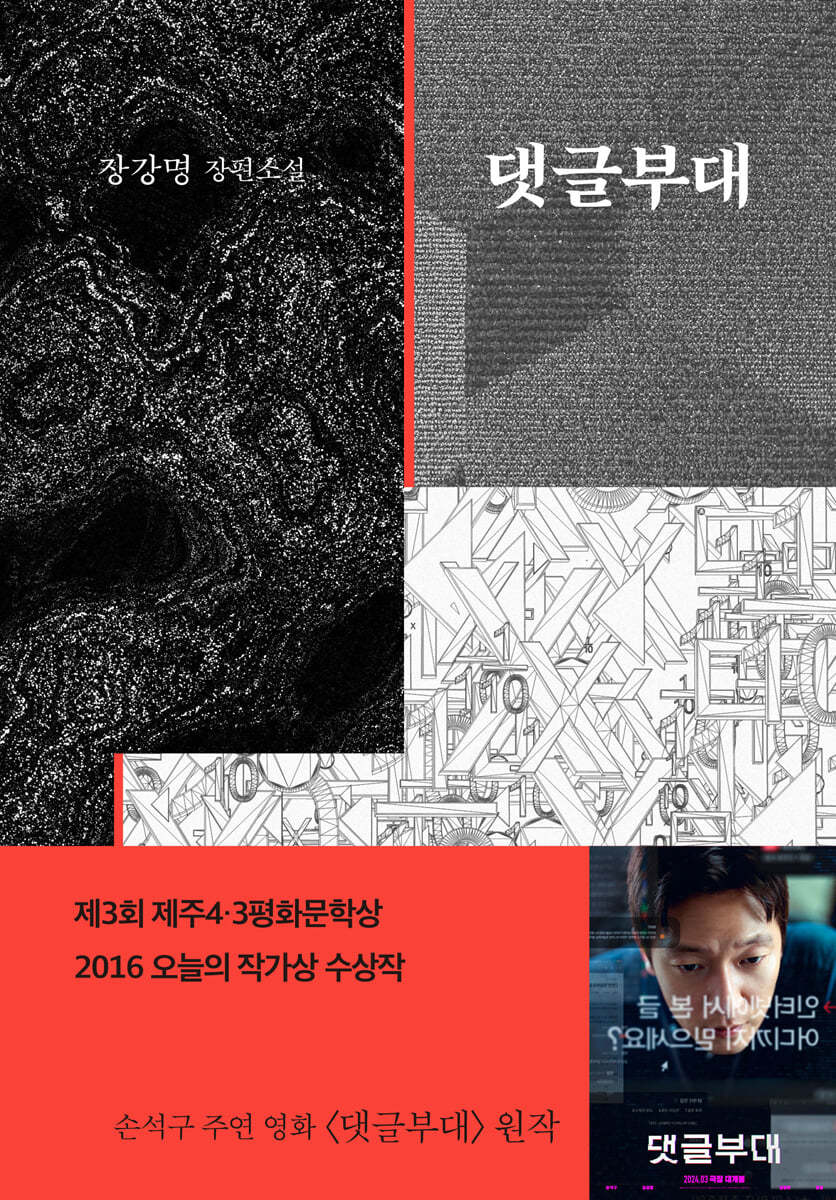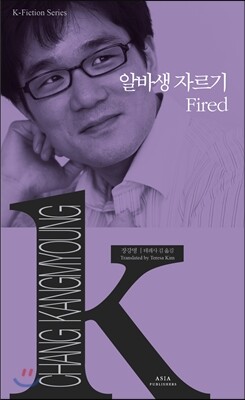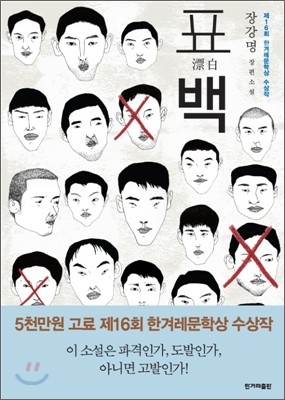대한민국의 소설가이다. 1975년 서울에서 태어났다. 연세대학교 도시공학과를 나와 건설회사를 다니다 그만두고 「동아일보」에 입사해 11년 동안 기자로 일했다. 2011년 장편소설 『표백』으로 한겨레문학상을 받으며 소설가로 데뷔했다. 2014년 장편소설 『열광금지, 에바로드』로 수림문학상, 2015년 장편소설 『댓글부대』로 제주4·3평화문학상, 『그믐, 또는 당신이 세계를 기억하는 방식』으로 문학동네작가상을 받았다. 그 외 장편소설 『호모도미난스』, 『한국이 싫어서』, 소설집 『뤼미에르 피플』을 썼다. 2016년 『댓글부대』로 ‘오늘의 작가상’을 받았다.
장강명의 이름을 독자들에게 알린 계기는 그가 작가내지는 작가 지망생들의 응모를 통해 운영되는 다수의 문학상을 수상했다는 사실이다. 장강명은 이에 대해 이렇게 말한다. “저는 앞서 문학상 네 개를 탔는데요. 명확한 응모 계기가 있었습니다. 재작년에 회사를 그만두고 원고를 써서 여러 출판사에 보냈어요. 그런데 대부분 답장이 없고, 원고도 받아주지 않더라고요. 다행히 얼마 후에 <수림문학상>에 응모한 원고가 당선되었죠. 그러고는 순진한 마음에 ‘이제 출판사들이 연락해 오겠지.’ 하고 기대했어요. 그런데 여전히 아무런 연락이 없더라고요. <수림문학상> 당선작 출간을 앞두고 있었는데 우연히 은행나무 출판사에서 나올 『호모도미난스』와 비슷한 시기에 출간 일정이 잡혀 버렸어요. 은행나무에서 <수림문학상> 당선작 출간을 미룰 수 없느냐고 물어 왔죠. 하지만 그냥 동시에 내기로 결론을 지었어요. 은행나무도 저도 출간 시기가 겹치더라도 장르성이 강한 『호모도미난스』가 성장 소설인 수림문학상 수상작보다 더 좋은 반응을 얻으리라 생각했거든요. 그런데 <수림문학상> 당선작과 달리 은행나무 출판사에서 낸 『호모도미난스』가 영 팔리지 않더라고요. 은행나무 주간님은 “요즘 문학상이 너무 많아서 문학상 당선작이 아니면 독자들이 쳐다보지도 않는 것 같다.”라고 말씀하셨어요. 그러면서 은행나무 출판사에서 주관하는 새 문학상이 생기니 원고를 내 보라고도 하셨죠. 하지만 이미 은행나무 출판사에서 작품을 발표했기 때문에 거기에 응모하진 않았죠. 이후 <수림문학상> 시상식 뒤풀이 때, 한 심사위원께서 이런 말씀도 하셨어요. “아직 대중에게 인지도가 있다고 보기는 어려우니 상을 더 타 보라.” 저 역시 비슷한 생각이었어요. 상을 탄다고 해도 누군가 원고 청탁을 해 오는 것도 아니었고요. 그래서 이후로는 일반 투고 대신 문학상에만 원고를 보내기로 했죠. 그런데 상을 하나 더 받았을 때도 상황은 변하지 않았고요. <제주4·3평화문학상>을 받았을 때도 인지도는 여전했죠. 상을 네 개쯤 받으니 그제야 독자들이 알아주기 시작했어요.” 장강명의 말에서도 알 수 있듯이 이제 작가는 스스로를 독자들에게 알려야 하는 시대를 살고 있는 것이다. 그런 점에서 장강명은 자수성가한 우리 시대의 소설가라고 부를 수 있다.
Chang Kang-myoung is a South Korean writer. He was born in 1975 in Seoul. He graduated from Yonsei University in urban engineering and worked in a construction company, which he quit. Then he entered Dong-A Daily and worked as a reporter for 11 years. He began his career as a writer when he was awarded the Hankyoreh Literary Award for his novel The Bleached (표백) in 2011. He received the Surim Literary Award in 2014 for his novel Yeolgwanggeumji, ebarodeu (열광금지, 에바로드, No Enthusiasm, Eva Road); he received the Jeju 4·3 Peace Prize for his novel Daetgeulbudae(댓글부대 The Comments Army) in 2015; and he received the Munhakdongne Writer Award for Geumeum, ttoneun dangsini segyereul gieokhaneun bangsik(그믐, 또는 당신이 세계를 기억하는 방식 Waning Crescent, or the Way You Remember the World). He has also written novels Homodominanseu (호모도미난스 Homodominance),Hanguki sileoseo (한국이 싫어서 Because I Don’t Like Korea), and a short story collectionLumière People (뤼미에르 피플). He received the ‘Today’s Writer Award’ in 2016 for Daetgeulbudae (댓글부대 The Comments Army).
Chang Kang-myoung became well known due to the fact that he has won multiple literary awards run through submissions from aspiring authors. On this, Chang Kang-myoung has said the following. “Before debut I won 4 literary awards, and I had a very clear reason to submit. The year before last year, I quit my job, wrote a manuscript and sent it to various publishers. But most didn’t reply, and they didn’t take my manuscript either. However, fortunately not long after, the submission I had made to the Surim Literary Award became selected. And naively, I thought ‘now publishers will contact me’. But still, there was no word from them. So I was looking ahead toward the publication of Surim Literary Award Winner Collection, and then by chance the publication date of that coincided with the publication of Homodominanseu (호모도미난스 Homodominance) from EunHaengNamu. EunHaengNaMu asked if the publication of the Surim Literary Award Winner could be delayed, but later we just decided to publish both. EunHaengNaMu and I both thought that Homodominanseu (호모도미난스 Homodominance), which is a genre fiction, would be more successful than the work that won the Surim Literary Award, which was a bildungsroman. However, unlike the Surim Literary Award Winner, Homodominanseu (호모도미난스 Homodominance) from EunHaengNaMu was just not selling. The editor in chief of EunHaengNaMu said that “because there are so many literary awards these days, it seems that if it didn’t win anything, readers don’t even look at the cover.” So the editor in chief suggested that I submit a manuscript to a new literary award being launched by EunHaengNaMu. But, because I already published a work from EunHaengNaMu, I didn’t apply there. Later during the Surim Literary Award ceremony after party, one judge said the following. “It’s hard to say that you are known to the public, so you should try winning more awards.” I was thinking the same thing. It wasn’t that even if I did win awards, someone was going to request a manuscript from me. So afterwards, instead of submitting to publishers, I sent manuscripts only to literary awards. But even when I won another award, the situation didn’t change, and even when I won the Jeju 4·3 Peace Prize my level of popularity was the same. After the fourth award, readers began to recognize my name.” As it can be seen from Chang Kang-myoung’s statements, it is now the age where readers must reach the audience themselves. From such a view, Chang Kang-myoung can be seen as a self-made writer of our time.
One thing that must be mentioned when talking about Chang Kang-myoung’s fiction is his long experience as a reporter. It has been said that “in Korean society, daily reporters receive the most rigorous training in writing. In order to learn how to confirm the truth, for 3 to 4 months they sleep only a few hours and live like beggars, panhandling for news at police stations. It’s common to get all kinds of creative curses from senior journalists just to finish one sentence. And after a month or two like that, they can write a certain amount of words within the deadline no matter what happens.” Though there is some exaggeration, as the quote about writing training that reporters go through tells, Chang Kang-myoung learned how to quickly write based on facts. However, literature and news are different, so this alone isn’t what is enabling fiction writing. So how does Chang Kang-myoung write fiction?<
Critic Seo Hui-won has written as following. “How does Chang Kang-myoung overcome the gap between the literary styles of fiction and news? To answer this simply, Chang Kang-myoung restores the relationships and the experiences of people faintly engraved in concisely written news articles in the form where various related events are shut off, and germinating the story within. However, it can’t be said that Chang Kang-myoung is creating novels, as read in significant meaning by Benyamin. The novel, which is based on the traditions of realism, as it was in early 20th century, it still doesn’t have competitiveness as a product in the Korean literary market of the 2010s. Instead, what is more preferred by people who are going through the general changes of the mobile environment founded in the Internet, is Chang Kang-myoung’s journalistic style of writing, resulting from his “rigorous training”. The nonchalant public armed with smartphones and connected to the world, read tens to hundreds of articles a day, and they are consuming news very quickly. To readers who are used to such reading environment, the book is not really a familiar nor useful medium. The writing in novels are ambiguous, have various meanings, and attempt to infuse information into the writer’s mind in order to change them into experiences of characters, and in return attempts to substitute them as meaningful time for readers. This is either too difficult to read, or it is just a succession of insufferable sentences that only bring boredom. In the case of Chang Kang-myoung, he writes his books by putting the journalistic style of writing at the forefront (such as Yeolgwanggeumji, ebarodeu (열광금지, 에바로드, No Enthusiasm, Eva Road) and Hanguki sileoseo (한국이 싫어서 Because I Don’t Like Korea)), or by strongly sequencing narrative elements that give genre specific interests on top of familiar literary styles (such as Lumière People (뤼미에르 피플) and Homodominanseu (호모도미난스 Homodominance), as well as putting the narrative together in a form of collage through various styles, such as declarations, biographies, reports, interviews, news articles, journals, and fiction (such as The Bleached (표백)).” This is an opinion that can be references for Chang Kang-myoung’s writing.
Nacido en 1975, Chang Kang-myoung trabajó en una empresa de construcción antes de pasar once años trabajando como periodista para el Diario Dong-A. Comenzó su carrera literaria en 2011 con su novela Blanqueo, que ganó el Premio Literario Hankyoreh. Entre sus novelas se incluyen: Prohibición contra Entusiasmo, Eva Road, Homo Dominance, Es Porque Odio a Corea, Cuarto menguante, o la forma en que recuerda el mundo, Unidades de Comentarios, etc. También escribió la novela por entregas Lumiere People. Chang Kang-myoung ha sido galardonado con el Premio Literario Soorim, el Premio Literario de Paz Jeju 4.3, el Premio Escritor Munhakdongne y el Premio Nuevo Escritor del 2016. En su corta carrera, Chang ya ha ganado numerosos premios y también muchos lectores jóvenes gracias a su modo de narrar cautivador y sus descripciones precisas y concisas de la sociedad coreana.
Чан Ганмён родился в 1975 году. Недолго проработал в строительной компании, затем более десяти лет занимался журналистской деятельностью. К литературному творчеству он обратился в 2011 году, взявшись за написание романа "Отбеливание", получившего литературную премию "Хангёре". Автор романов "Ева роад: фанатеть воспрещается", "Хомодоминация", "Потому что я не люблю Южную Корею", "Конец месяца или каким образом вы запоминаете мир", "Коммент-отряд", а также серии романов "Люмьер пипл". Лауреат литературной премии "Сурим", литературной премии "Чеджу 4·3 мир", премии "Мунхак тонне", премии молодому писателю 2016 года. Этот писатель в очень короткое время сумел завоевать несколько литературных премий и моментально покорил молодых читателей, воссоздавая в своих романах портрет современного южнокорейского общества с помощью лаконичных и точных предложений, а также увлекательной манеры повествования, притягательной для широких масс.





